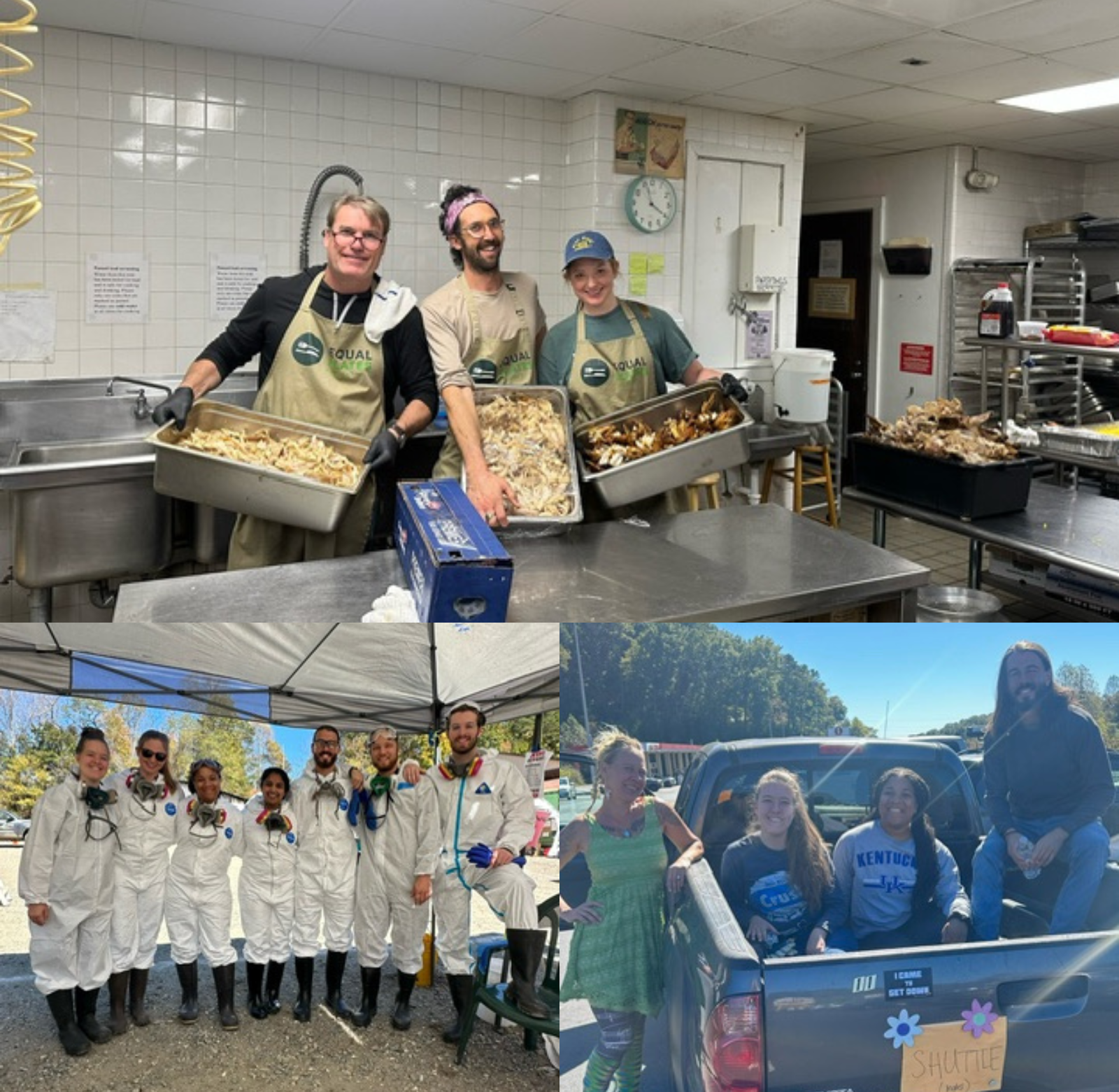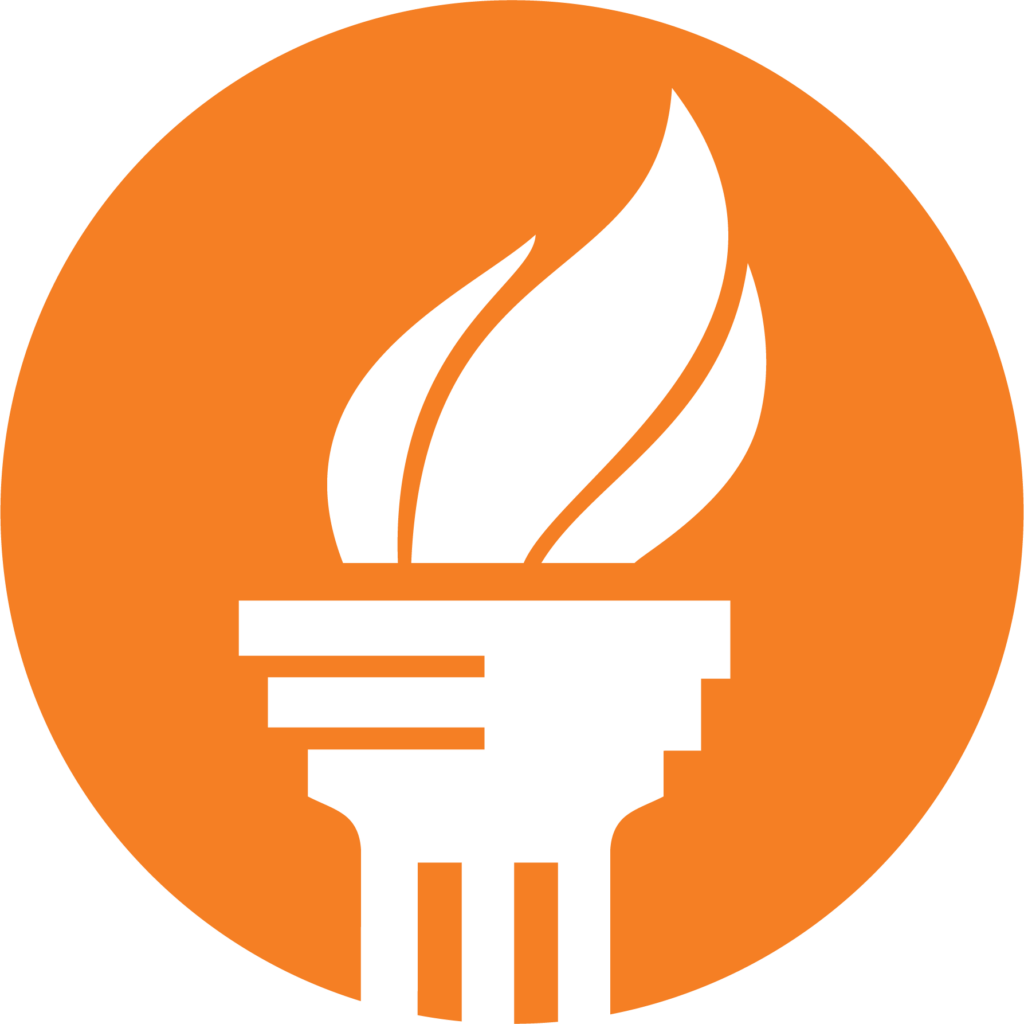A Call to Action
When Hurricane Helene swept through North Carolina, leaving flooded towns and shattered lives in its wake, the Algernon Sydney Sullivan Foundation had a choice: write a check or roll up their sleeves. They chose to do both. While financial support was important, the need to take direct action and be present in the community seemed the most urgent and meaningful response. Within two weeks of the hurricane’s devastation, Sullivan Foundation staff and volunteers were on the ground, ready to help.
Caroline Burlingame, the Foundation’s Director of Operations, shared the story of the Foundation’s involvement. “We learned about the flooding and damage around Asheville and Black Mountain, and almost immediately we knew we needed to do more than just cancel our events,” Burlingame said. “We wanted to be there in person, helping out.”
The Foundation had initially planned their Ignite Retreat, Fellows Retreat, and the Faculty and Staff Retreat for that weekend in the affected areas. Instead of abandoning their plans, they chose to shift gears and transform what was supposed to be a gathering of fellowship and education into direct action and support for a community in crisis.
Shifting from Retreats to Relief
By the time they arrived, the damage from Hurricane Helene was undeniable. The streets of Marshall, North Carolina were a stark sight—buildings hollowed out, walls darkened with mud. Burlingame and her team made their way into crawlspaces, shoveling mud while clad in protective gear. “It was really eye-opening to see the extent of the damage,” Burlingame reflected. “We were head to toe in toxic mud, shoveling it out of people’s homes and businesses. It was physically demanding, but we knew it was making a difference.”
The team—a group of nine—included Sullivan Foundation staff as well as volunteers from the network. They spread out across affected areas, spending long hours cleaning out mud-soaked buildings, transporting buckets of sludge, and doing whatever was needed.
“We worked with Equal Plates, Haywood Street Congregation, and others to clean out kitchens and community spaces,” Burlingame explained. “Many of the people we were working alongside were familiar faces. They had partnered with the Sullivan Fellows on prior projects, and this was another opportunity to deepen those relationships.”
Building a Respite Space for Recovery
While the manual labor was crucial, the Sullivan Foundation didn’t stop there. They saw an opportunity to provide emotional and psychological support as well. Burlingame spoke of a unique initiative set up by the team—a respite space.
“At Hawk Creek Commons, we put together a space where community members could come for a break from the chaos,” she said. The room, designed to be calming and restorative, was filled with gentle light, comfortable seating, and even massage therapy stations. “We had two massage therapists there, offering a bit of comfort and relaxation to people who were going through such a tough time. It was amazing to see the positive impact that simple acts of kindness can have. People just needed a moment to breathe, and we were able to offer that.”
The respite space wasn’t only about massages and hot coffee. It became a place where people could talk about what they had experienced and begin to process their losses. “Jake, one of our social workers, was there to listen to people’s stories,” Burlingame said. “That’s an aspect of service that often gets overlooked—giving people a chance to be heard.”
A Community Effort
The spirit of collaboration and community was evident everywhere. In Marshall, volunteers were shuttled to work sites in the back of pickup trucks, driven by local residents. “It was like a scene out of an old-time community effort,” Burlingame recalled. “We’d hop in the back of a truck, and they’d take us through flooded streets to wherever we were needed. There was this incredible sense of unity. Everyone was helping everyone.”
Equal Plates, a local food initiative, was also deeply involved. They had been producing over a thousand meals a day for the community. The Sullivan Foundation team stepped in on weekends, cleaning and organizing the kitchens to give the chefs a break. “By taking care of the kitchens, we allowed the cooks to rest,” Burlingame said. “It was our way of saying, ‘We’ve got your back.’”
The support went both ways—when the workday was over, Luke, one of the Equal Plates organizers, invited everyone over for dinner. “We gathered at his home and shared a meal with everyone—the kind of hospitality that reinforces the idea that we’re all in this together,” Burlingame added.
Plans for the Future: A Sullivan Corps
The experience of volunteering in Hurricane Helene’s aftermath has laid the groundwork for the Foundation’s next big project—a Sullivan Corps. The initiative, still in its early stages, is an ambitious effort to formalize service trips as a part of the Foundation’s ongoing mission.
“We realized that we needed to do more than just support relief efforts here and there—we wanted a dedicated team that could be mobilized in times of need,” Burlingame explained. The plan is to launch a pilot trip in January, inviting twenty Sullivan Fellows and a handful of staff members to participate in an intensive week of hands-on service work in North Carolina.
“It’s not just about giving back; it’s also about the experience for our fellows,” Burlingame said. “This is something that can’t be replicated in a classroom. The lessons learned on the ground—whether it’s shoveling mud, organizing kitchens, or simply listening to someone’s story—are the most meaningful.”
The Sullivan Corps will be an annual initiative, driven by the recognition that the need for such direct, hands-on work is ongoing. Beyond hurricane relief, the Foundation plans to expand to other types of community needs, giving Sullivan Fellows the opportunity to continue making an impact year after year. This tragic event has inspired a commitment to ensuring that each new group of Fellows carries forward the spirit of service.
An Experience That Resonates
The Hurricane Helene service trip wasn’t just about cleaning up or providing meals. It was about bridging the gap between what the Sullivan Foundation teaches and what it does. “We talk a lot about servant leadership,” Burlingame said. “But this was a chance to really put that concept into action—to not just teach it, but to live it. And I think that’s why it resonated so much with everyone involved.”
The response from the local communities was a testament to the power of showing up. “We had people come up to us, asking who we were and why we were there,” Burlingame said. “Explaining that we were from the Sullivan Foundation and were just here to help made sense to people in a way that sometimes our programming doesn’t. They could see us—they could see what we were doing, and they got it.”
Steve McDavid, president of the Sullivan Foundation, reflected on the Foundation’s commitment: “We believe that true servant leadership means stepping up in times of crisis, not just with words or donations, but with action. The creation of the Sullivan Corps is our way of making sure that our values translate into tangible support for communities in need, and that our Fellows gain real, impactful experiences in the process.”
The Sullivan Foundation, with its history of nurturing leadership and character, has always believed in hands-on action, in meeting the world’s needs with courage and compassion. In North Carolina, they had the chance to live out those values—not just as individuals, but as a community, showing up when it mattered the most.
Back to all News items.


